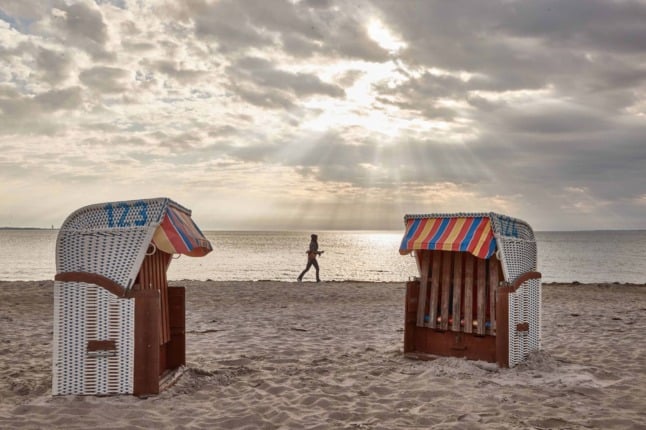Many areas of life in Schleswig-Holstein are being revived. Bars and restaurants are once again able to open for both indoor and outdoor dining, and boat trips are back up and running.
Up until this week, tourists were only allowed to spend the night in four areas within the northern state, which acted as trial regions before the full reopening of public life. Germany has closed most of its tourism infrastructure since November.
The state has the lowest rate of coronavirus infection in the whole country, with the 7-day incidence rate currently standing at 35.1 per 100,000 inhabitants.
READ ALSO: Northern German state leads the way as Covid cases fall nationwide
This is not quite a return to normality, however. The terms of the opening mean that tourists will still have to meet hygiene requirements and wear masks in some public areas. It is still mandatory to wear a mask on public transport, but an FFP2 mask is no longer required.
Visitors will also be required to present a negative Covid-19 test result upon arrival and then every three days going forward.
A negative test result, proof of full vaccination, or proof of recovery from a recent infection, will also be mandatory if holidaymakers wish to eat and drink inside restaurants.
The leader of Germany’s Hotel and Catering Association, Ingrid Hartges, is calling on other states to follow a similar approach.
“I feel we can learn from Schleswig-Holstein,” said Hartges on Sunday evening. Despite the opening of the tourist industry in four trial regions, the infection rate has continued to drop across the state.
READ ALSO: EXPLAINED: Germany’s new relaxed quarantine and testing rules for travel
Hartges made clear that there should be a focus on a ‘responsible reopening’ of the sector, saying that the hospitality industry is not a driver of the pandemic and has been hit particularly hard by Covid regulations.
Other tourism reopenings around Germany
As of Saturday, several regions in Baden-Württemberg have also reopened hotels and restaurants to the public and a number of other German states are planning to relax restrictions ahead of the Whitsun weekend. Germany has a national public holiday on Monday May 24th.
The mayor of Hamburg, Peter Tschentscher, is set to suggest to the city council on Tuesday that outdoor dining should reopen for the religious holiday.
Lower Saxony and Mecklenburg-Western Pomerania, where the 7-day incidence rate is in the region of 50 per 100,000, are taking a more cautious approach to neighbouring Schleswig-Holstein. Lower Saxony has initially only opened tourism to residents of the state.
In Mecklenburg-Western Pomerania, tourism will be open for residents from June 7th, and for guests from other states from June 14th onwards. It will be possible to eat both inside and outside restaurants this weekend.
Dietmar Bartsch, the head of Die Linke in the Bundestag, criticised the state’s hesitance in easing the lockdown, saying it did not make sense to postpone it for so long.
Why tourism is opening up again
The reopening of tourism and hospitality is only becoming possible because of the significant progress of Germany’s vaccination programme. In some states, vaccine priority has been lifted at GP surgeries, meaning anyone can book an appointment to get their dose.
Baden-Württemberg and Berlin are ploughing forward with this strategy from Monday onwards, with Bavaria following their lead during the week and Saxony implementing the new approach from next Monday.
READ ALSO: When will tourism in Germany open up again?
However, in many places there will not be enough vaccine doses to meet demand, meaning not everyone will be able to make an appointment as quickly as they may like. The priority list still applies in vaccination centres.
More than 30 million people in Germany have now had at least one dose of the Covid vaccine, and nine million people are fully inoculated.



 Please whitelist us to continue reading.
Please whitelist us to continue reading.
Member comments